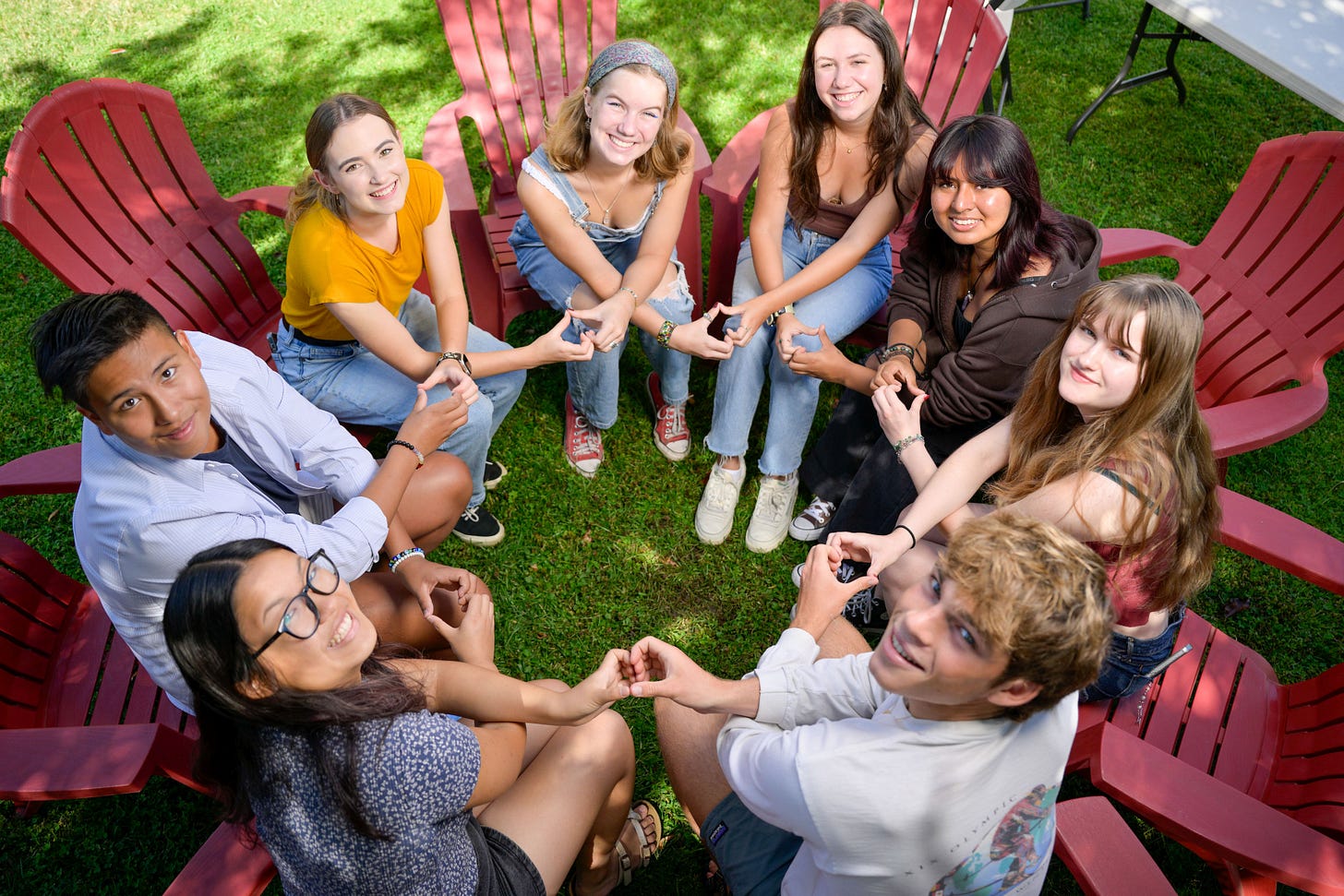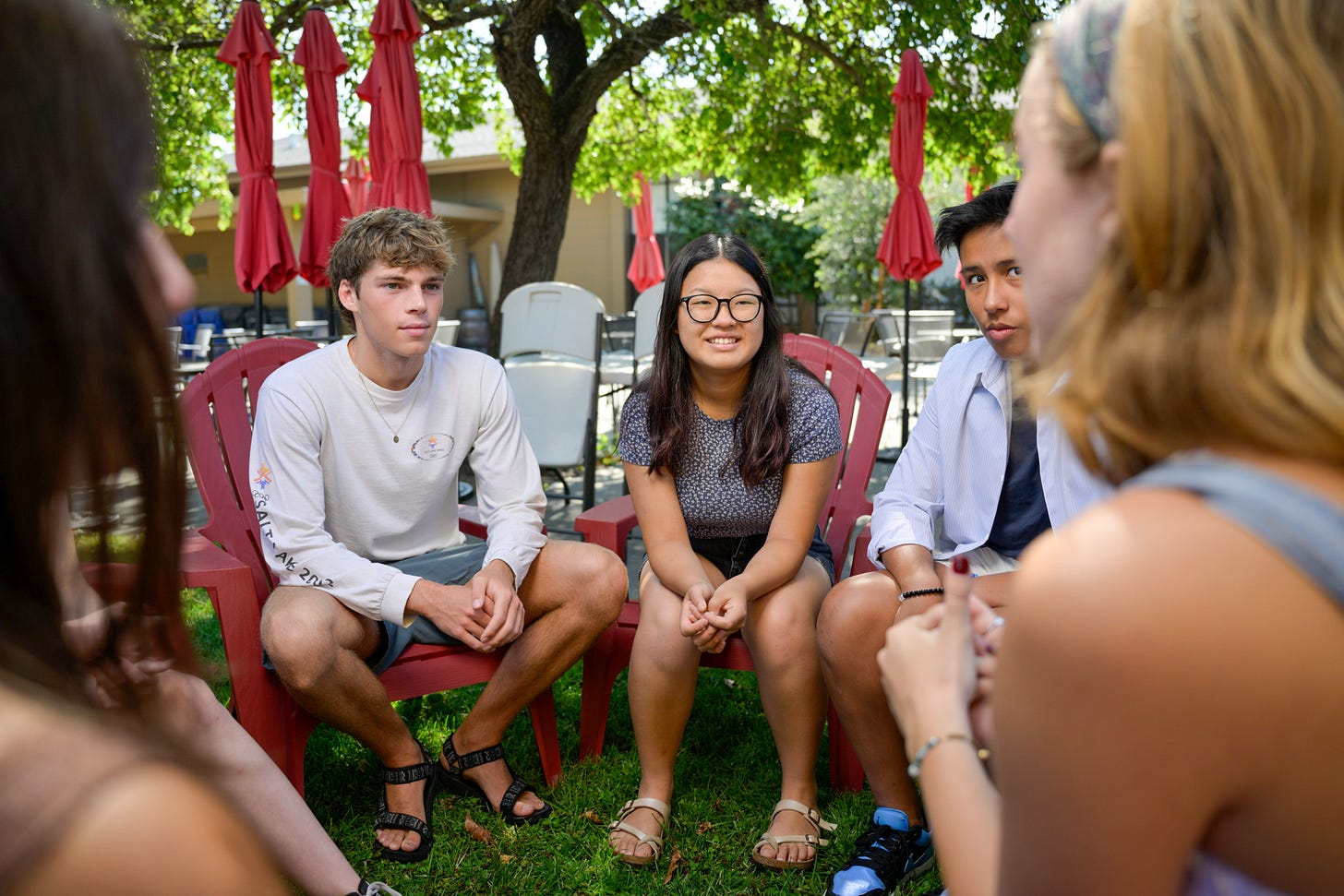NAPA, Calif. — I’m more popular in high school now than I was when I was in high school. As I mentioned in my last column, I struggled with depression and suicide ideation throughout my teen years. I didn’t know how to be myself, connect with others or seek help for my mental health struggles. I felt awkward and alone. Today I build programs that I needed back then. Because I don’t know what it’s like being a teen today, I spend a lot of time listening.

I listen to understand. I don’t listen to give answers or solve problems. Teens need more listeners and fewer preachers. What our young people see, feel and experience today breaks my heart. These are some of the things I’ve heard from listening to thousands of young people since starting my nonprofit.
Youth feel a constant pressure to have everything figured out. To know what they want to be when they grow up. To succeed academically, to be the best at sports, music, art and other extracurriculars. To be perfect. To do all the extra things to stand out on college applications. To get into college, which becomes more competitive every year. They feel pressure to look a certain way, to fit in, to have a lot of friends, to have sex, to try drugs, to give in to peer pressure. Social media fuels their feelings of not being good enough. It increases feelings of isolation, social anxiety and depression. It also exposes our young people to violent content.
Moreover, youth today feel helpless and overwhelmed about the state of the world. They fear being shot at school, the aftereffects of COVID-19, devastating wildfires. Mixed messages due to our divided political landscape create more confusion. Young people today are especially worried about climate change. Climate anxiety, also referred to as eco-anxiety, refers to distressing feelings related to the impacts of climate change. The consequences of climate-related distress are profound and can be debilitating.
Youth want and need to be accepted and validated for who they are, regardless of their skin color, gender and sexual orientation, religion, country of origin or abilities. They need social connection, safe places and supportive people to hang out with. They need to be seen and heard. And sometimes they need outside support.
Aside from fixing global and climate issues, how do we give our youth what they need to thrive?
We start by listening.

Being a good listener doesn’t come naturally for everyone. I still make mistakes. I was having a conversation with a teenager a few weeks ago in which she was sharing about her struggles, and I made a big mistake. I gave advice without being asked, and it stopped the conversation almost immediately.
Learning how to be a good listener may take some effort, but trust me, it’s worth it. Active, authentic listening improves communication, strengthens relationships and builds trust. If you’d like to improve your listening skills there is plenty of information out there. A quick search on the Psychology Today website produced dozens of articles about the art of listening.
I learned a lot about listening while raising my boys. My older son has always struggled with his mental health and was recently diagnosed with autism. When he was younger we got to a place where he’d come to me and say, “Mom, I’m not feeling well mentally.” This was the perfect conversation opener, and I’d take time to sit with him and listen to what he was feeling. It’s important to ask your kids, “How’s your mental health?” and not just ask them questions about homework, friends, their future and other subjects that may make them feel more anxious. Check in with them -- often.
Be prepared that your teens may not want to open up to you about their feelings if you are their parent or caregiver. It’s important that youth have a support system of people they can consistently rely on, and this should include supportive non-parent adults. This adult can be a teacher, a coach, a mentor, an extended family member, a counselor or therapist.
If you’re like me, you may have a hard time accepting that summer is over. The positive side of this is that our schools in Napa County offer quite a bit of support for our youth. The secondary schools have resources available through wellness centers or counseling offices. Do your research now so you know where to get help if/when your teen needs it.
Here’s a tip for parents with children starting college — identify support available on college campuses sooner rather than later. Many community colleges and universities have wellness centers and mental health staff. Napa Valley College has a full-time therapist embedded in their counseling office.
Outside of school our Mentis Youth Resource Database offers connection to local organizations providing mental-health services, wellness and prevention programs for youth.
If your teen is craving social connection, encourage them to check out student-led clubs on their school campus or learn more about our Mentis Teens Connect program. Teens Connect is an inclusive group of compassionate young people, open to youth ages 13-19. There are many ways to get involved with activities that focus on caring for self, others and the community.
In my next column I look forward to sharing more about how to create authentic connections with youth and how to advocate for your children when they need additional support.
If you or someone you love is experiencing a mental health crisis, call or text the 988 Suicide and Crisis Lifeline.
If you or someone you love needs mental health or wellness support, please visit our Mentis Youth Resource Database.
As the founder of Teens Connect and director of Mentis’ Prevention Division, Jeni Olsen manages youth wellness programs through a mental-health lens together with local teenagers and her prevention team. As a director, speaker and writer she is often sought out for her in-depth expertise around teens and her forward-thinking, collaborative approach to supporting youth and their complex needs.





Thank you for clearly speaking about the fact that many of us really do not know what listening entails, and that there are resources available to help us learn and practice. I am grateful to know that there are resources available to all ages- children, teens, adults, parents, grandparents, family friends, etc. Listening takes practice for many of us and it is one of the most valuable tools available to us. Especially if we are "helpers.' I hope it is ok to share this with someone outside of the Napa Valley, as this information is timely and critical. Our youth are our future. Let us help them to have the most productive and "good" lives as possible, no matter what their challenges may be.
Thank you, Jeni! I knew you were very involved with “youth connections “…now I know why! I look forward to your next article.
Peggy Frost (your “former” Malone neighbor)